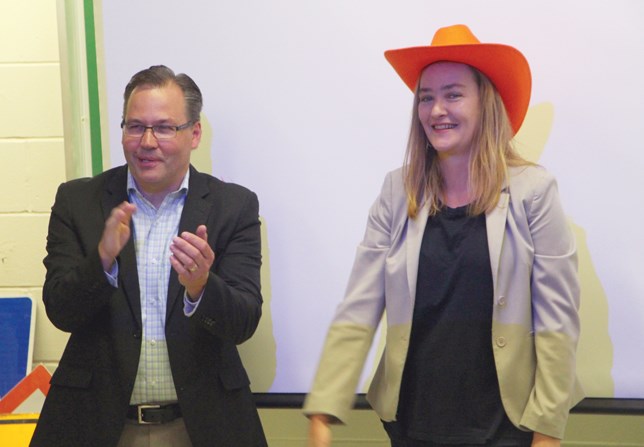It was a homecoming for Tracy Seeley. The producer with CBC made a trip home to Yorkton to screen the film Dirty Work and talk about her work and career with a home town crowd, speaking to students at the Yorkton Regional High School in the morning and a general audience at night to kick off the Yorkton Film Festival.
“I really feel thrilled to be here, almost a little bit speechless. It’s really moving, connecting my work which means so much to me and my hometown which means so much to me as well,” Seeley said.
Seeley produced Dirty Work as part of The National. The film follows a raid into a sweatshop in India, where children are made to embroider clothing.
“Stories about children really are the most important in the end. Certainly it felt like that to me as a journalist, stories that involved children and children in harm’s way really hit home so much harder.”
The film was made in a unique way, with the majority filmed on smart phones. This was done for purely practical reasons, Seeley says, as a traditional bulky news camera would be hard to maneuver and draw attention to itself, while a phone was compact and inconspicuous.
“It reminds me of when I was in radio, when interviewing someone for radio was easier than interviewing for television sometimes because people wouldn’t shy away from the cameras. Smart phones can sometimes have almost the same effect, they can be a little less intimidating and sometimes it can protect you.”
The shifting world of technology is something that Seeley admits has an impact on her work. Dirty Work, for example, would be different if filmed today rather than three years ago, when it was made originally, because Seeley has more experience with social media and knows the importance of adapting work for different platforms.
“Before, we always target one television program. Now, and it’s actually exciting to think what would the YouTube community want with this? What would the Facebook community want with this? What would the Snapchat community want with this?”
That said, Seeley still believes that the most important product is the full length documentary, even if it’s important to get versions out for other platforms.
“There would still be a long documentary, in depth is still on trend.”
Seeley’s nephews provided voices for the children in the film, because they were around the same age as the kids who were forced to embroider clothing.
“It really hit home, again, how young these children were in India. To me, my nephews are so little, they are the furthest thing from laborers I can imagine, but here they are the same age as these kids working away in these embroidery factories.”
The film depicts a raid on an embroidery factory, but Seeley emphasizes this is not a problem exclusive to India – instead, it’s a problem that is becoming well known in India because of Kailash Satyarthi, who has won a Nobel Peace Prize from his work trying to rescue kids from child labour.
“India isn’t the only place where this happens, India isn’t the only place with this challenge, but it is a unique way of tackling it.”
Part of the day involved talking with students. While the crowd at YRHS was quiet – which Seeley admits was exactly the same as when she was a student in those same seats – she believes they’re the ones news organizations have to pay close attention to, because they’re on the cutting edge of technology.
“I think they’re consuming social media in ways that people like me will never understand as thoroughly. They can really take new directions in storytelling, working with people like me... Young people get engaged, as well, in ways that I feel are really exciting, in terms of news. If we can put that together I feel as though the future of journalism is really bright.”
Going to a school is also a fit with the themes of Dirty Work, a film that shows the importance of kids going to school. It was also a theme of a film shown only to the high school class, which showed life after ISIS in Mosul, and how kids are reacting to returning to school after two years. Seeley says that access to quality education is something people have to fight for, because the impact on children is clear.
“Sometimes things just really come down to the basics. When children are taken away from school, bad things happen, it really as simple as that.”




